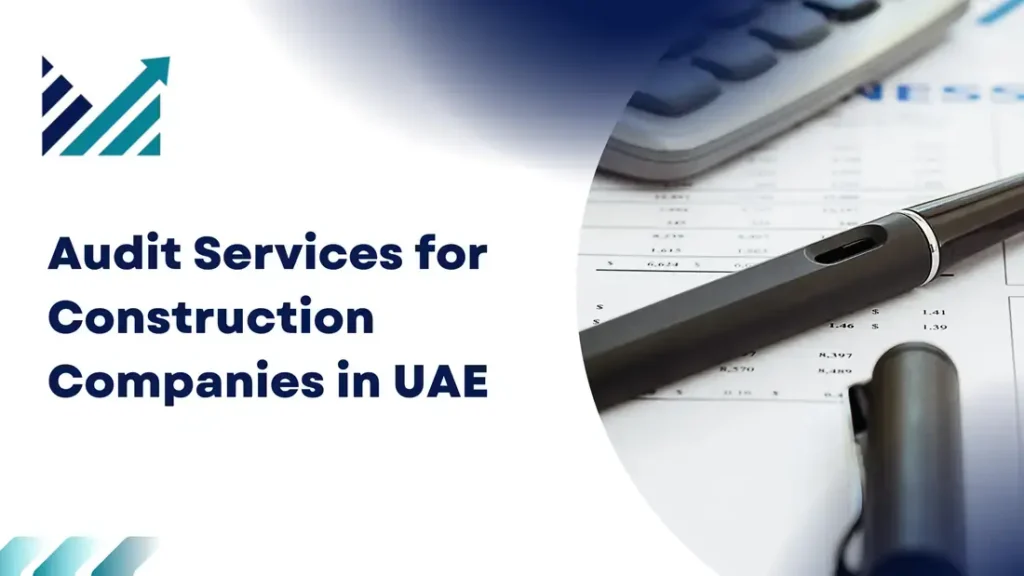
The construction industry in the UAE is one of the region’s strongest pillars. With iconic skylines, mega-projects, and continuous urban expansion, it plays a critical role in the country’s economic growth. Yet, running a successful construction business in the UAE isn’t simple. It involves large investments, tight project deadlines, and strict compliance requirements.
That’s why audit services for construction companies in UAE are not just helpful—they are essential. An audit doesn’t just check numbers; it supports decision-making, risk management, and business sustainability.
In this article, we’ll explore the unique challenges construction companies face, the role of auditors, and why choosing specialized auditors makes a difference.
Challenges Faced by Construction Companies in UAE
Operating a construction business in the UAE comes with a set of unique challenges:
Complex projects and contracts
Many construction companies handle multiple projects at the same time, often across different emirates. Each project may involve complex contracts, joint ventures, or subcontracting.
Cash flow pressures
Construction projects often face delays in client payments or unexpected costs. This puts pressure on working capital and cash flow management.
Regulatory compliance
The UAE government regularly updates laws, including tax regulations like VAT and corporate tax. Staying compliant requires constant monitoring.
Cost overruns and project delays
Fluctuating material prices, design changes, and unexpected site conditions can lead to cost overruns or delays.
Managing subcontractors
Construction companies often rely heavily on subcontractors. Tracking payments, quality, and timelines adds complexity.
Accounting complexity
Revenue recognition, retention, and work-in-progress calculations can be tricky. Errors can lead to misstated financial statements.
These challenges make independent auditing not just a legal requirement in some cases, but also a strategic advantage.
The Role of Auditors for Construction Companies
Auditors play a multi-faceted role for construction businesses in the UAE.
1. Ensuring financial accuracy
They review accounting records to ensure they present a true and fair view of the company’s financial position.
2. Compliance verification
Auditors help confirm that the business complies with local regulations, including VAT and corporate tax laws.
3. Risk identification
They highlight areas where the company may face financial, operational, or compliance risks.
4. Process improvement
Through detailed reviews, auditors recommend improvements in internal controls, project tracking, and cash flow management.
5. Supporting decision-making
Reliable audit reports help owners and managers make informed decisions about new projects, expansions, or partnerships.
Key Areas of Focus for Auditors
Professional auditors typically focus on several critical areas during a construction company audit:
Project revenue and cost recognition
Auditors check whether revenue and costs are recognized following applicable accounting standards (e.g., IFRS). This includes reviewing work-in-progress (WIP) schedules.
Change orders and variations
They ensure that additional work is properly approved, documented, and accounted for.
Contract compliance
Auditors verify that the company adheres to the terms of contracts with clients, suppliers, and subcontractors.
Cash flow and liquidity
They analyze cash flow statements to ensure sufficient liquidity for ongoing and future projects.
Subcontractor payments
Auditors review payments to subcontractors and confirm that obligations are met, while avoiding duplicate payments.
Retention and advances
Construction projects often involve retention money and advance payments. Auditors ensure these are correctly recorded and reconciled.
Tax compliance
They verify VAT filings and corporate tax calculations to avoid penalties and interest.
Risk assessment
Auditors assess exposure to project delays, disputes, and cost escalations.
By focusing on these areas, auditors help construction companies achieve better control and reduce unexpected surprises.
Helpful for you: Difference Between VAT and Corporate Tax in UAE
Benefits of Professional Auditing Companies
Choosing a professional and experienced auditing firm in UAE offers construction companies several advantages:
Increased transparency: Reliable financial statements build trust with investors, banks, and project partners.
Regulatory confidence: Ensures compliance with VAT, corporate tax, and other legal requirements.
Better cost control: Auditors can identify cost overruns early, helping management take corrective action.
Improved internal controls: Auditors recommend process improvements, reducing the risk of fraud or errors.
Enhanced credibility: A clean audit report enhances your reputation in the market.
Strategic insights: Professional auditors bring industry experience and highlight trends or benchmarks.
These benefits are especially valuable in the UAE’s competitive construction market, where every advantage matters.
How Does a Construction Audit Work?
A construction audit is a structured process, typically carried out annually or at the end of major projects. Here’s an overview of how it works:
Step 1: Planning
Auditors meet with management to understand business operations, project portfolio, and key risks.
Step 2: Risk assessment
They identify areas where misstatements or inefficiencies are more likely, such as large projects, subcontractor payments, or VAT compliance.
Step 3: Data collection
Auditors review project files, contracts, invoices, bank statements, and accounting records.
Step 4: Fieldwork
They test selected transactions, verify documentation, and check internal controls.
Step 5: Analysis
Auditors compare actual results to budgets, review WIP schedules, and test cost allocations.
Step 6: Reporting
The audit report summarizes findings, recommendations, and confirms whether financial statements give a true and fair view.
Throughout the process, auditors maintain open communication with management to address questions or concerns.
Checklist for Internal Audit for Construction Companies
For companies conducting internal audits, here’s a practical checklist:
- Review project budgets vs. actual costs
- Check revenue recognition policies
- Verify change orders and variations are approved and documented
- Review subcontractor contracts and payments
- Check retention money and advance payment schedules
- Analyze cash flow projections
- Test VAT filings and tax compliance
- Review project timelines and causes of delays
- Assess internal controls around procurement and payments
- Evaluate insurance coverage for projects
Regular internal audits help construction companies detect issues early and maintain financial health.
Why Choose Specialised Auditors
While any licensed auditor in Dubai can perform an audit, construction companies benefit from specialists.
Industry knowledge:
Construction specialists understand the complexities of large projects, joint ventures, and revenue recognition methods.
Relevant benchmarks:
Specialized auditors can provide valuable benchmarks like average gross margins or project duration trends.
Better risk insights:
They identify industry-specific risks, such as change order disputes or subcontractor defaults.
Efficient audits:
Experience means faster audits with fewer disruptions to daily operations.
Tailored advice:
They offer practical suggestions that fit the unique nature of the construction industry.
In the UAE, where construction projects often exceed hundreds of millions of dirhams, choosing a specialized auditor can protect your business and reputation.
Tax Audit of Construction Companies in UAE
With the introduction of VAT in 2018 and corporate tax from June 2023, tax audits have become an important part of compliance for construction companies.
What does a tax audit involve?
- Verification of VAT filings and tax returns
- Checking input tax credits and output tax calculations
- Ensuring correct tax treatment of retention money, advances, and change orders
- Reviewing documentation to support tax positions
A tax audit isn’t necessarily an indication of wrongdoing—it’s part of the Federal Tax Authority’s routine checks.
How can auditors help?
- Prepare companies for potential tax audits
- Identify errors or non-compliance early
- Help maintain proper records to reduce tax risks
Given the complexity of construction projects, working with experienced auditors significantly reduces tax-related challenges.
Audit Services for Construction Companies in UAE FAQs
How often should a construction company have an audit?
The frequency varies by company size and complexity. However, annual audits are standard practice in the UAE.
What are the key financial metrics for construction companies?
Important metrics include revenue, gross profit margin, net profit margin, return on equity (ROE), and cash flow from operations.
How can auditing help construction companies manage project costs?
Auditors analyze budgets, track actual spending, and flag deviations early, helping prevent cost overruns.
What are the key risks associated with construction projects?
Project delays, cost overruns, disputes over change orders, and supply chain issues are common risks.
How can auditing help construction companies improve cash flow management?
Auditors review cash flow statements, identify bottlenecks, and suggest ways to improve collections and manage outflows.
How can auditing help construction companies manage change orders?
By reviewing the approval and documentation processes, auditors help ensure that change orders are properly priced and accounted for.
What are the key challenges of auditing construction projects?
Complex contracts, multiple subcontractors, changing timelines, and project-specific accounting rules make construction audits challenging.
Conclusion
Audit services for construction companies in UAE go beyond checking compliance—they add real value. From managing complex contracts and project budgets to ensuring tax compliance, auditors support construction businesses in building sustainable growth.
Choosing an experienced, specialized auditor is an investment in better control, transparency, and business success.
Whether you’re managing skyscrapers in Dubai or infrastructure projects in Abu Dhabi, having a trusted audit partner can help you navigate the industry’s challenges and opportunities.

